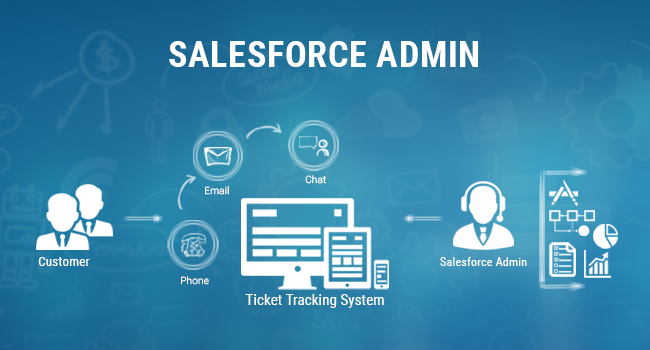Salesforce Administrator vs. Salesforce Developer

Digital transformation has become a priority for most of companies across the world. A report by Connectivity Benchmark had already stated in 2019 that almost all companies are either planning to or already undergoing some sort of digital transformation. In this process, they are turning to cloud technology to drive capacity, pull together various disparate applications in use, and overall productivity. One of the top vendors in enterprise cloud computing is Salesforce. A leading Software as a Service (SaaS) provider, Salesforce is popularly known for its Customer Relationship Management (CRM) platform.
The growth of Salesforce can be understood from the fact that its market share grew by more percentage points than 15 other CRM companies combined (Source: IDC). Even when it comes to IT jobs, Salesforce is one of the most in-demand skills. If you are exploring the job roles related to Salesforce, there are two popular designations you will come across – Salesforce Administrator and Salesforce Developer. Based on the job role you choose, Salesforce offers a variety of certifications.
Whether you are targeting a Salesforce admin job or preparing for a Salesforce Developer certification, a training course proves to be quite handy. Many training providers now offer in-depth courses on Salesforce. Even when you search for Salesforce Administrator and developer training in Toronto, you will get many reliable options to choose from. But before you decide to take up a training course, you should know what a Salesforce developer and a Salesforce administrator are and how both the job roles differ.
What is a Salesforce Administrator?
A Salesforce Administrator is an individual who works with stakeholders to define the system requirements and customize the platform. They clearly understand an organization’s goals and suggest solutions so as to make the most of the Salesforce technology. Using the platform, they create easy-to-use dashboards, intelligent workflows, and applications for any kind of project. Such trained professionals also solve complicated business problems and remove bottlenecks in a project.
Salesforce admins wear different hats in organizations, meaning their jobs are combined with other roles based on the needs of a specific organization. In any organization, Salesforce administrators maintain the platform and train other employees to use Salesforce at any technical level. For this responsibility, they are expected to stay updated on Salesforce’s new tools, features, capabilities, and updates.
What is a Salesforce Developer?
Salesforce describes its developer role as someone who loves cracking the code on tricky business problems. Such individuals believe in automating repetitive tasks, building architecture for a new feature, and diving into coding to implement that feature. Another task these programmers perform is building Salesforce applications across various PaaS (Platform as a Service) platforms. Tools like Visualforce and Apex along with frameworks like Lightning Component come in handy when they develop such applications.
You may find that the responsibilities of a Salesforce developer are quite similar to a software developer. Well, the coding techniques are similar, the difference here is that Salesforce is the platform used for application development. Some organizations look for salesforce developers who are knowledgeable in HTML, JavaScript, Visualforce, customized function development, third-party integration, Force.com, and Heroku, among other skills.
Salesforce Administrator vs. Salesforce Developer
Before going through the differences between both the roles, it is important to note that both of them are equally good careers. It just depends upon one’s interests what career path they want to choose. Here are the basic differences between the two designations:
What they do – Salesforce administrators basically focus on how an organization can leverage the full potential of Salesforce. They may perform user maintenance tasks, create reports and dashboards, and offer continuous support to employees. Developers, on the other hand, majorly focus on creating applications using Salesforce. They perform tasks like writing Apex code, building Visualforce pages, test development in a staging box, fixing bugs, and more.
Skills required – The knowledge of the Salesforce platform is a common skill required for both roles. But looking forward, Salesforce administrators are expected to be skilled in business process, data management, formulas and validation, process automation, and system configuration. While for a developer role, recruiters look for skills like application lifecycle management, Apex, system integration, JavaScript, Lightning Web Components, object-oriented programming, and web services.
Career prospects – As per the data available on the Salesforce website, Salesforce developers earn somewhat higher salaries than administrators. For the former, the average salary in the US stands at $108,000 while for the latter, it stands at $91,000. The new jobs posted in 2018 in the US were higher for developers (89K) than administrators (48K). But this shouldn’t be a deciding factor as the figures change every year and depend on the location, organization hiring, level of experience, and other parameters.
Certifications – Basically, there are two certifications designed particularly for admins – Salesforce Administrator and Salesforce Advanced Administrator. One can also pursue CPQ Specialist, Marketing Cloud Administrator, and Platform App Builder certifications working as admins. Now with a developer in mind, the dedicated certifications are Salesforce Platform Developer I and Platform Developer II. The other suitable credentials are B2C Commerce Developer, Industries CPQ Developer, JavaScript Developer I, Marketing Cloud Developer, and OmniStudio Developer.
Hopefully, now you have a clear idea of both Salesforce roles. Now you can decide which role matches your career interests.





